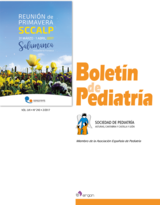Signos de alarma en las enfermedades metabólicas hereditarias
D. González-Lamuño
Bol. Pediatr. 2017; 57 (240): 91 - 96
La mayoría de las enfermedades metabólicas se debe a una deficiencia enzimática en alguna de las numerosas vías metabólicas derivadas de los carbohidratos, las proteínas o los ácidos grasos, o del tráfico intracelular. Se manifiestan en cualquier momento de la vida, sobre todo en el periodo neonatal, pero también pueden hacerlo en la infancia o edad adulta. Aunque todavía no se diagnostican de forma suficiente, en los últimos años el campo de los errores innatos del metabolismo (EIM) ha evolucionado desde lo que constituía un grupo limitado de enfermedades raras (ER), poco frecuentes, desconocidas y a menudo fatales, hacia una serie de enfermedades graves pero tratables. Dadas la diversidad y la baja frecuencia de cada uno de los EIM, su seguimiento se realiza habitualmente en centros de referencia, pero en todos los demás escalones asistenciales deben poder iniciarse investigaciones y/o tratamientos antes de referir al paciente. Los responsables de la atención de pacientes afectos de un EIM deben conocer las características básicas de cada enfermedad, los alimentos permitidos y prohibidos, las posibles complicaciones y cómo actuar ante descompensaciones agudas a las que idealmente debieran anticiparse.
Warning signs in hereditary metabolic diseases
Most metabolic diseases are due to an enzymatic deficiency in one of the numerous metabolic pathways derived from carbohydrates, proteins or fatty acids, or from intracellular trafficking. They manifest at any time in life, especially in the neonatal period, but they can also do so in childhood or adulthood. Although not yet sufficiently diagnosed, in recent years the field of inborn errors of metabolism (EIM) has evolved from what constituted a limited group of rare, unknown and often fatal diseases to a series of serious but treatable diseases. Given the diversity and low frequency of each of the EIM, their followup is usually done in reference centers, but in all other levels of care should be able to initiate research and / or treatments before referring the patient. Those responsible for the care of patients affected by an EIM must know the basic characteristics of each disease, the permitted and forbidden food, the possible complications and how to act in the face of acute decompensation to which they should ideally anticipate.
Artículo completo (PDF) (100 kb.)
- Endocrino-Metabolismo
